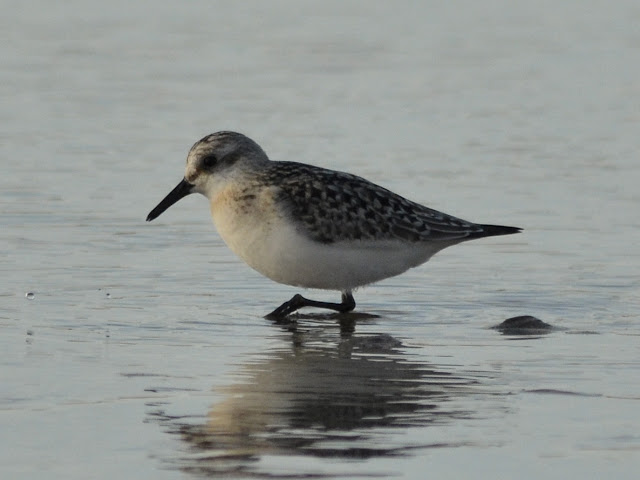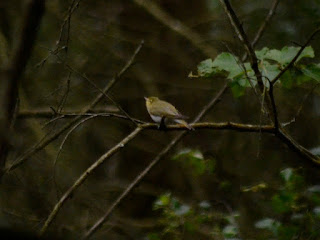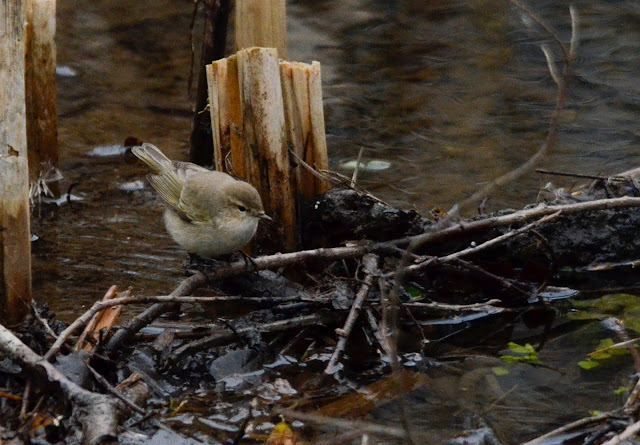Took some time to photograph a group of sanderlings on my work trip, whilst I stayed alongside Morfa Dyffryn, in an air bnb above the Ty Meirion Gallery.
Sunday, 29 September 2019
Friday, 23 August 2019
Gronant - June 2019
Having a couple of days on the road up to North Wales with
work left me in a position to finally pay a visit to Gronant to see the little
tern colony, and snaffle an all-round lifer.
On arrival I nearly went wrong,
but I’m glad I did because I saw a couple of painted lady butterflies along a
path which I shouldn’t have taken, and I think it’s the first time I’ve
knowingly seen this species. It was great to see them, and it blows my mind
that they migrate to us from North Africa. The site was covered in orchids, and
I could have spent a good while having a look around, but time was against
me. I retraced my steps and set off once
more for the tern viewing platform.
The site was alive with other birds, like stonechats and
their offspring, and a very wary heron that kept taking off as soon as it saw
me on my way around to the colony viewpoint. I passed an area that was enclosed
for natterjack toads, and if I’d had time I would have liked to see if I could
see any.
Just as the tern project’s blog had warned, there was a bit
of flooding on site from the recent run of bad weather, but luckily it had
subsided somewhat, and I didn’t have to jump far to clear the water besieging
the boardwalk. On arrival at the top of the platform I instantly saw the terns
flying in from the sea and up the beach carrying food for their chicks. The
colony itself is fenced in to protect the terns, and policed by a team of
volunteers. I stayed well clear of the colony, but hopped down the dune on to
the beach, and took some flight photos of the terns as they flew past. Not an
easy one with a dodgy 300mm lens, but managed a few passable shots.
Saturday, 25 May 2019
Rudry pics - 25/05/2019
I've been walking Olive up Rudry Common recently, making the most of the light evenings. I found a garden warbler singing near the car park, and then I also found a singing wood warbler in the mixed woodland to the west of the top of the common, a very good record for the site.
Friday, 22 March 2019
South West Takedown - 22/03/2019
The myth and legend falls!

Amazing views though very difficult to photograph, and a much desired lifer in the bag. Bonus marsh tit was also very nice, as was a mandarin duck.
Green sandpiper, garganey (didn't expect that !), and marsh harrier at Bowling Green Marsh on the way home. Great day out, and we were home by 1.30pm!

Amazing views though very difficult to photograph, and a much desired lifer in the bag. Bonus marsh tit was also very nice, as was a mandarin duck.
Green sandpiper, garganey (didn't expect that !), and marsh harrier at Bowling Green Marsh on the way home. Great day out, and we were home by 1.30pm!
Saturday, 2 March 2019
Spring catch-up : Feb and March 2019
The last week or so of Feb saw some crazy high temperatures for the time of year. Whilst it lifted our moods and made us look forward to the coming summer, it was also a cause for concern. With new high temperatures smashed for the UK winter, you had to wonder if this was the kind of extreme weather event the climatologists warn about.
Some very early swallows were found by Gower Ornithological Society, and one of which turned out to be red-rumped! Amazing find. Nick and I duly paid a visit on a Sunday morning, and enjoyed some good views before it temporarily moved out. The bird went on to spend a week or so in the vicinity, but that was a great lifer to start 2019 on. During the course of the week, another swallow turned up, and even a sand martin. Mad scenes. Some terrible light meant poor photo's.
I fancied clearing my head Saturday 2nd March, so I tried my luck on abother grey day at Forest Ganol. I got 6 birds at one point.
Some very early swallows were found by Gower Ornithological Society, and one of which turned out to be red-rumped! Amazing find. Nick and I duly paid a visit on a Sunday morning, and enjoyed some good views before it temporarily moved out. The bird went on to spend a week or so in the vicinity, but that was a great lifer to start 2019 on. During the course of the week, another swallow turned up, and even a sand martin. Mad scenes. Some terrible light meant poor photo's.
Sunday 24th Feb I took myself off to Van Rd to practice with depth of field against busy backdrops.
I fancied clearing my head Saturday 2nd March, so I tried my luck on abother grey day at Forest Ganol. I got 6 birds at one point.
Saturday, 12 January 2019
Sibe Chiffy - Parc Slip 12/01/2019
After a long week at work I decided that a morning out
birding would be a good way to recharge. After mopping up a few year-list
species at Ogmore I headed to Parc Slip to pay homage to the wintering Siberian
Chiffchaff which had been found over Christmas.
I nipped down the side of the centre to get a good view of the reedbed
and feeders, and within a couple of minutes the little fella flitted into view
from the reeds, and twice came out foraging on the mud. It was a typically
dingy January day and my ISO was cranked high, so I managed nothing more
satisfactory than the two below.
An article on Bird Guides describes identification of
tristis on the following criteria:
• Absence of
olive in the crown and mantle
• Absence of
yellow away from the underwing
• Presence
of a grey-brown or pale brown hue in the upperparts
• Presence
of warm buff in the supercilium and ear-coverts
• Presence
of buff at the breast-sides/flanks
• Very
black-looking bill and legs
• A thin,
piping near-monosyllabic Bullfinch-like or Dunnock-like call
• A song
markedly different from western Chiffchaff's.
Siberian chiffchaff breeds in Siberia, east of the Pechora
River and winters in the lower Himalayas. For now at least, tristis is
maintained in P. collybita by most checklists, but at some point this may become an ‘armchair’ tick if it
separated out as a different species.
After admiring the bullfinches on the feeders, I headed to
the first hide and bumped into Nick. We caught up, and I hoovered up a few more
for the old year list, including only my first coot and grey heron of the year,
and a few others like teal, wigeon, and little grebe.
Subscribe to:
Comments (Atom)






















